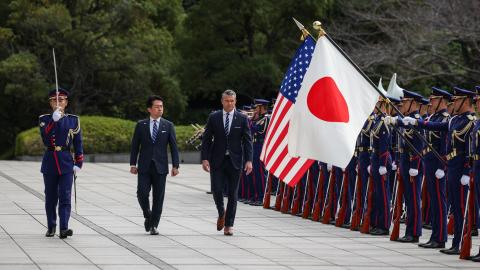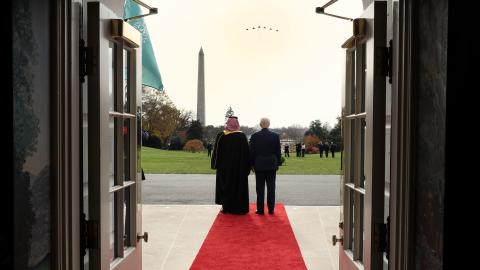U.S. President Barack Obama has spent much of the last 12 months emphasizing the "mutual interests" that Washington shares with Beijing and the "mutual respect" they feel toward one another, despite inevitable disputes. Democratic members of Congress have held their tongues as Obama does his wooing; Republicans have seethed at the soft approach. Yet valiant though his attempts may have been to convince the Chinese (and himself) that power is not a zero-sum game, 2009 proved the opposite. Last year, Obama was ignored, rebuffed, and even humiliated by Beijing. And now the grievances on both sides are piling up: U.S. tariffs on Chinese tires, China's currency manipulation, Chinese hacking of Google, U.S. arms sales to Taiwan. The gloves have come off.
Expect 2010 to be the year that Obama gets tough and relations with Beijing get nasty. What Washington really wants from China is for it to be part of the solution rather than a problem on global issues--to be a "responsible stakeholder," a term coined by former Bush administration official Robert Zoellick. The idea was that it was in China's interest to contribute to global solutions for conundrums such as climate change or Iran getting nuclear weapons. China, however, often doesn't see it that way, believing that its relegation to a "responsible stakeholder"--along with emerging multilateral institutions like the G-20--is cleverly designed to keep China down.
So which U.S.-China disputes are intractable, and which are more easily solved? Think about them in three basic categories. Fundamental disagreements are the ones in which the Chinese Communist Party sees its very existence under threat; don't expect compromise there. Serious disagreements emerge over issues that could thwart China's rise in the region. And manageable disagreements are those that could merely damage China's reputation or some of its more minor economic interests. Here's how the most important U.S.-China quarrels break down:
Fundamental Disagreements
Climate change: The Obama administration sees climate change as a chance to demonstrate its moral leadership. But to get political support at home, Obama needs China to agree to binding emissions cuts. China sees things differently: Carbon reduction is an economic sacrifice that won't pay off for decades, if it does at all. And the Communist Party, which believes it must maintain 8 percent annual GDP growth to prevent social unrest, simply can't justify that. Any drop in growth is seen as a threat to stability, so Beijing's promises on climate change will inevitably be broken--note China's pointed refusal at the Copenhagen summit to agree to let outside parties verify its emissions reductions.
Tibet and Xinjiang: The United States has long supported the dual freedoms of religion and expression for ethnic Tibetans and Uighurs in China. But Beijing's insistence that its treatment of ethnic minorities is an "internal matter" is absolute. A combination of recent historic humiliation at the hands of foreign powers and a habitual suspicion of outsiders have convinced Beijing that the United States and its allies are intent on ultimately "dividing and carving up China" in order to weaken it. Support for Tibetans and Uighurs under the banner of "human rights" is seen as another Western "divide and rule" strategy. U.S. meetings with the Dalai Lama, for example, are guaranteed to produce fireworks from Beijing. Because while there are just 4.5 million Tibetans and 10 million Uighurs, the lands they occupy happen to be resource-rich and strategically important.
Serious Disagreements
Taiwan: Nicknamed America's "unsinkable aircraft carrier" by Gen. Douglas MacArthur, the island continues to receive U.S. backing--most recently in the form of arms shipments--and remains a critical component of the "protective shield" blocking China's geopolitical rise in the West Pacific. Washington is unlikely to walk away from the autonomous island, which is today a functioning democracy. Nor is Beijing likely to yield what it sees as its territory, and a painful reminder of China's past impotence and indignity at the hands of colonial powers. The island split off from China when the defeated Nationalists fled the mainland in 1949. Since then, Taiwan's continued independent existence has left open the question of whether it or the mainland is the "true" China.
Beijing usually wins that contest, and it reconciles the current setup as "one country [China], two systems [democracy, communism]." If Washington were ever to challenge that status quo, the quarrel would escalate to the "fundamental" disagreement category. For now, however, Beijing grudgingly accepts Washington's relations with the island, so long as it recognizes the mainland as the "true China." Condemnation of Washington's recent $6.4 billion arms sales to the island is typical bluster and little else, since the delivery won't fundamentally alter the military balance that is now decidedly in China's favor.
Rogue states: China has a bad habit of supporting international pariahs, and Washington would very much like it to stop. Yet Beijing's sponsorship of the likes of North Korea, Burma, and Iran speaks much about the country's strategic vulnerabilities. As far as Beijing is concerned, the dictatorship in Pyongyang is preventing the emergence of a unified Korea sympathetic to U.S. interests. Besides, the chaos that would result from a crumbling North would spill over into China. In Burma's case, Communist Party leaders are greedily eyeing a transport route from the Indian Ocean that could be developed through that resource-rich country, freeing China from its dependence on the U.S.-patrolled Strait of Malacca. Iran, for its part, remains a loyal supplier of resources to energy-hungry China (also the basis for Beijing's current interest in Africa). And as far as China is concerned, many U.S.-labeled "rogue states" are simply those that refuse to accede to a Washington-led order --fertile ground for China to try to exploit.
Manageable Disagreements
Military competition: It's easy to understand why China's military looks disconcerting from Washington, especially given the force's recent buildup. Yet as long as Washington accepts that China is a strategic competitor, this military rivalry is just part and parcel of power politics. This is not to say that military spats, such as the harassment of a U.S. Navy surveying vessel by Chinese ships in the South China Sea in March 2009, are not potentially destabilizing or that Washington should remain complacent. But such a rivalry is not unusual between a superpower and a rising competitor desperate to protect its burgeoning interests.
Economic disputes: Good news: Most of the recent flare-ups have been over economic issues and stand a better chance at getting resolved. The United States would like China to appreciate its currency, allowing the prices of its exports to rise. China is irritated that several recent bids by its state-owned companies to buy majority stakes in U.S. companies such as Unocal, a part of Chevron, had to be withdrawn due to intense political opposition. U.S. tariffs on Chinese tires and steel pipes have angered Beijing. But these are all small potatoes and just examples of the normal give-and-take of a complex trade relationship. China, for its part, still views trade and globalization as a zero-sum game designed to enhance the power and wealth of the Chinese state. Note ongoing Chinese attempts to control the global supply of "rare earth" metals, which are essential to many "green" technologies such as wind turbines and lasers. The quotas of these metals to foreign companies are shrinking fast, giving China's own state-owned enterprises an upper hand. Meanwhile, U.S. provocations such as the tire tariffs are partly a result of a recession-induced protectionist sentiment; they aren't evidence of a lasting shift.
But economic disputes--including the political fallout from the Google situation and China's possible loss of "face"--can be contained. Both sides know they ultimately gain much more from economic interaction than they stand to lose.
The one exception might be Google's recent ultimatum that it could pull out of the Chinese market if it must continue to censor search engine results. Economic engagement with China is not just good business for U.S. companies; it's a means to hasten the arrival of a freer, more open, and even democratic system in China. So far, however, the Chinese Communist Party and its state-run corporations have been the primary beneficiaries. Until that changes, at least some things about the U.S.-China relationship never will.
















